Editor of this issue: Thomas Remeikis
Copyright © 1964 LITUANUS Foundation, Inc.

|
LITUANUS
LITHUANIAN
QUARTERLY JOURNAL OF ARTS AND SCIENCES
Volume 10, No.1 - Spring 1964
Editor of this issue: Thomas Remeikis ISSN 0024-5089
Copyright © 1964 LITUANUS Foundation, Inc. |

|
KRISTIJONAS DONELAITIS
METAI - THE SEASONS
Jau saulelė vėl atkobdama budino svietąCLARK, MILLS, the principal translator of Donelaitis, is a poet in his own right and author of several collections of poetry. He has translated extensively from the French, Polish, and Lithuanian literature and is one of the editors of the forth-coming collection of Lithuanian folk songs in English — The White Linden — to be published this year by the Voyages Press, New York.
From
THE SPRING'S JOYS
Now the sun rose again to rouse the world
And laughed to topple down chill winter's labors.
And cold's creations, with the ice, diminished
As foam of snow changed everywhere to nothing.
Soon the bland weather stroked and woke the fields,
Called up herbs of all species from the dead.
Thickets and every heath bestirred themselves;
Hill, meadow, dale threw down their sheepskin jackets.
All that had perished in foul autumn, tearful,
In the lake clung to life the winter through,
Or in some burrow slept beneath a bush,
Crept forth in crowd and throng to welcome summer.
And rats with skunks walked out of their cold crannies
As crows, ravens and magpies, with the owls,
Mice and their offspring and the moles, praised warmth.
Beetles, mosquitos, flies, a bounce of fleas
Formed their batallions everywhere to plague us
And sting both peasant and his genteel Sir.
And the queen bee remembered to awaken
Her hive and send it forth to gainful labor.
Through chink and opening they swarmed in clouds
To play their tuneful pipes in the mild air.
Spiders, in corners motionless, wove yarn
Or soundless, climbed the scaffolds of their snares.
And wolves and bears hopped to the forest-edge,
Joyful that someone might be there to rend
(Clark Mills)
It was a wondrous thing that of the endless flock
None of the warblers wept when reaching our dear shore.
No; not to weep, but to rejoice they all came here.
For now the winter's chills and frosts were at an end,
And the enchanting spring wrought wonders everywhere.
Ah, now in every place new life was all athrob;
The air was filled with tunes of songsters on the wing.
Some sang in lower key, some soared to heights of tone:
Some flew far,
far above, up to the silvery clouds:
Some on a low bough perched
— and all of them praised God.
As yet the food was scarce,
but none of them complained.
Some had returned in worn and shabby
feathered garb,
Some carried back a maimed or broken wing or crest,
Though in the fields they found but little sustenance,
They did not
grieve and no heart-breaking tears were shed;
They all sang their merry
melodies.
(Nadas Rastenis)
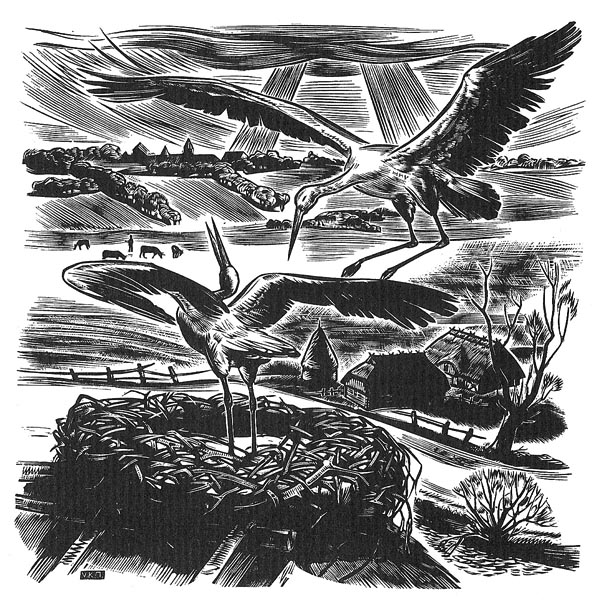
And the stork, returning gladly with his neighbors,
On the straw roof,
landlordlike, clattered his bill.
And his wife, already, as he stood
rejoicing,
Clambered once again out of the cold household,
Greeting
with her pointed beak her loved companion.
They discovered the straw
roof grieviously damaged,
And their new home, built a mere two years
before,
Weather-beaten, torn, and broken — almost ruined.
Walls and braces, beams, and many solid rafters
Winter gales had
loosened from the roof of straw.
Doors were ajar, the windows and the
sills had fallen;
Somehow, everywhere, the whole abode seemed crooked.
So they both at once, like all good homemakers,
Turned to the task:
everything to rebuild again.
Soon the husband gathered boughs and twigs
in armfuls,
While, without delay, his wife patched up their home.
Then
the two, after their heavy toil and labor,
Flew off swiftly to a marsh,
to fish their dinner.
Then, when they had eaten some few toads and
froglets,
They thanked God with all their faith and hearts.
Trivial
man, thou, learn at last to be contented!
And in tastier satisfactions,
think on God.
... But the nightingale, till now cunningly hidden,
Paused for all the
others to break off their singing.
This is how, each year, she is the
last to warble,
And at night, when the whole world is warm with sleep,
Alone she watches, worships God in darkness.
And as dawn breaks, and we
clamber from our beds,
Often she can rouse us, gladdening our hearts.
Glorious God, how holy each of Thy provisions!
In the fall and winter
we take to our bedding
And snore, all nestled up beside the kindly
oven.
Then, creature we cherish, not even you appear;
Like us, you lie silent in the shield of darkness,
There in dreams, perhaps, capturing foolish flies.
But joyous, when we come to celebrate the springtime
And make ready to begin our labors in the fields,
You take up your singing shepherd's pipe at once, and
With each ringing voice and sound and gentle tone,
Urge us to rejoice and lift our labor's burden.
Tell us, dear bird! Why are you forever hidden,
Singing as the darkness falls, and through the night?
Why so hide yourself, with all your tales to sing?
Surely all souls — peasant, lord with arms akimbo,
Children who run pantless, and the wheezing old —
All admire and all give praise to your good song,
As for us all you warble miracles, nightingale!
Your voice silences the organ and the cymbal.
Violins and zither pause, ashamed, when you
Lift your sweet voice up and up, in simple song...
There queenlike, amidst the other singing birds,
You explode in your glad song, gloriously.
When, at times, we catch a glimpse of your attire,
Then like peasant, sparrow, you appear to us.
Garments of the nobles, exquisitely sewn,
And their showy headdress you would scorn to wear;
Always, like a peasant-woman, plain, you chatter.
Ah, among all peoples, many times it happens
That we look with greed on the world's petty changes.
Great oaf, Diksas, with his swollen urban airs
And his glittering clothes, each day reviewed, renewed,
Like an idol, preens his cockscomb for the peasants;
But when we must witness all his foolish gabble,
Even simple peasantry must spit, and wonder
That such pompous, blinded louts can scorn the Lord,
And like squires grinning, show off their stupidity.
Oh, how often Krizas, in his shoes of felt
And his peasant sheepskin jacket, worn for visits,
Under his plain roof sings like a nightingale
As, with his whole heart, he gives praise to his God.
(Clark Mills)
From THE TOILS OF SUMMER
Hail, everchanging world, you've kept the feats of springtime;
Hail, man too, for you've survived to see the summer.
Hail, your lusty sniffings; hail, your joy in flowers,
Hail! God grant you goodly springtimes in abundance;
Strapping and carousing, may you live to meet them.
God grant this to each who, loving his Lithuania,
Tends his chores as serf and, faithful, speaks Lithuanian.
May he meet, God willing, every spring robustly,
May he go on merrymaking into summer."
Thus, before Whitsuntide, Prickus roused the peasants
With a slant on how to labor in their serfdom.
"Look, a sturdy restless body, always busy,
Seems to be a special gift from God, His finest.
Such a man will hustle roundly till he's drooping,
Bow before his meager supper with contentment,
Haying eaten, thank the Lord with satisfaction,
Roll into his bed, bedrowsed but strong and happy.
He outwits the gentleman who, richly tailored,
Reaches for his spoon, but stops to list his ailments.
What's the good that Mikols gives the world his presence,
Bobbles bloated paunch, himself puffed like a bladder?
Like some lowly rogue, he's troubled and uneasy,
Ever cringing, for, like Cain, he's scared of heaven.
What's the good that Diksas, naked in his riches,
Kneels before his hoard of gold and worships, groaning?
When he needs to use one coin, he's scared to take it;
Starved, he swallows uncooked victuals like an idiot,
Shivering in his ragged finery, near naked.
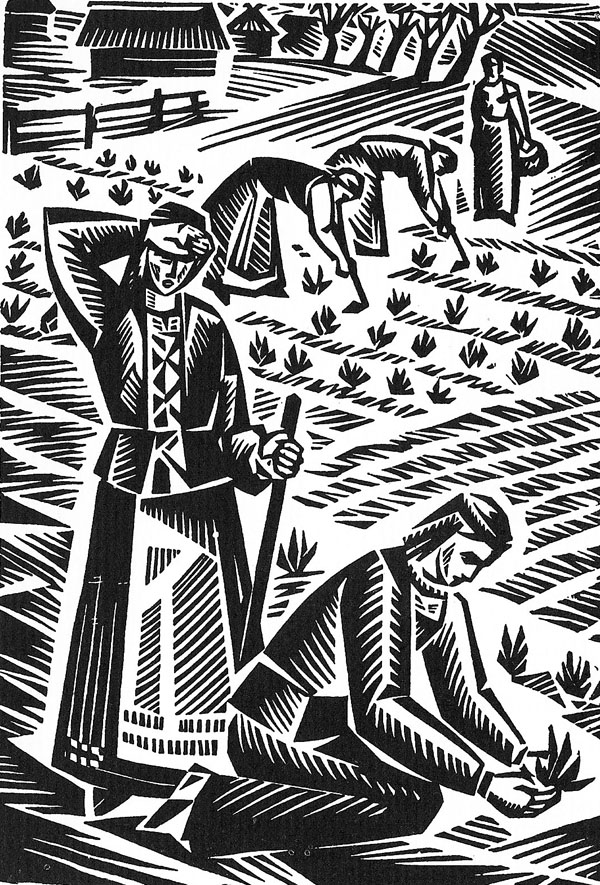
Illustration from "The Seasons" by V. Kalinauskas
"We Lithuanians shod in bast shoes, we're called wretches,
We're too lowly for the lords and all their servants;
But we're not afflicted by their lordly ailments.
How they grunt and groan in town and country manor
While the summer comes to cheer us with a visit;
There's one with his gout, he's bawling loud and loutish,
There's another, how he bellows for a doctor!
Ah, but why are rich men plagued by such afflictions?
Why does death reap up the lords before their hour?
It's no riddle; scoffing at the chores of peasants,
Lazy, shamming good, they overstuff their stomachs;
We, the serfs they scorn, our stomachs light with skimmings,
Buttermilk and whey, we hurry-scurry briskly;
With a snatch of bacon or Lithuanian sausage,
We work better at the labors forced upon us."...
(Demie Jonaitis)
"So," said Lauras, leaning on a crooked stick,
"Let's praise God! We end the springtime hardy;
Robust all of us, we're here to meet the summer.
How the sun, its upward climb again completed,
White, its calm wheel spoked with daylight ever higher,
Poised immobile, stands and plays on radiant heaven!
And how clear it burns! Our own lamp, how it flames,
Chars already garlands of the earth, and slow
Alchemist, transfuses their splendor into fodder!
Some, alas, of our herbs are now stripped so naked
That like hags, already ancient, they sit shrunken.
Many the garden workman plucked up in his hand
And, a while, joyed in their variegated beauties,
Then cast them aside already withered, worthless.
"So, too, with our cheerful birds — it was the same.
Calls of cuckoo, warblings of the nightingale,
What the skylarks, paired in flight, played and invented,
All are ending, or have now completely ended.
Living creatures, many, who began as nestlings,
Fathers lost, and mothers, now must feed themselves,
In their warblings echoing the parents' voices.
So at once the world's almost as if renewed.
I, an old man, see these marvels and exclaim,
Sighing with a woeful wonderment and sorrow:
Oh, how empty are the labors of our age!
As Saint David tells us, we are fragile beings;
Like the flowers in the fields, we grow and blossom.
Each man at his birth is like a simple bud —
First his blossom will unfold and open out,
Then, his flowering over and himself divested,
He brings forth his fruits that end his time alloted.
This, exactly this, happens to all us wretches.
We, peasant and landlord, in the cradle whining,
Show so faintly in the bud our life to come!
Later, with the time already here to blossom,
One, foppishly skipping like a gentleman,
And another, scurrying like a peasant boor,
Waste their days of youth away in foolish frolic.
Yet, already, as the beard begins to grow,
And as each must turn his hand to earnest labor,
Ah, how soon our foolish childlike fancies fade!
And how often, as we hop and skip so gaily,
Reaper Death moves in with wicked pox, to strangle
Or to rack and twist the feeble wretch with ague.
And for girls and youngsters she forever hones her
Ready scythe, and without care for their young faces,
Blindly hews, so well that bonnet, braid, and cap
With the beauties of the world turn into nothing.
Well, you see then, how the brief life we call human
And the flowering, falling blossoms are the same."
... Some plucked lordling often seems to laugh at peasants,
And the fool, who smiles, despises their hard labors,
As if he could keep his footing without peasants
Or take pleasure in his cakes without their dung?
Ah, what would lords do if they should lose their peasants,
And if such poor people didn't bring their dung?
Don't mind, comrades, as you clear and sweep the dungheap,
That all kinds of stenches sometimes make you sneeze
Or that in the stable you must wade and groan.
It would seem, lord's pampered nose must turn away from
All your work, and laugh and sneer, tilted upward;
Watch how easily, though, it would bend downward
If like us, poor wretches, they should have to swallow
Watery borscht and burnt porridge down their gizzards,
Or to share with all of us the woes of serfdom.
. .. Women, as for you, why do you grow so idle?
Why do you not pluck and hatchel the flax properly?
Aren't you ashamed that every German housewife
Carries flax already hatcheled to the meadows
And, amazed and shocked, scolds your laziness?
Females, Lithuanians, don't you bow your heads,
Quite ashamed, that even women of the Germans
With their neat work in the meadows have disgraced you?
What, then, when the time is here to spin and weave
And your flax lies wet on the untended fields?
O our ancient times, wherever have you gone,
When our women did not put on German garb
And could not pronounce the German words and phrases?
Now not only do they preen in German dresses.
They've contrived already, now, to speak in French.
Babbling on so, they forget even their tasks!
(Clark Mills)
From THE AUTUMN'S RICHES
Again the sun abandons us, she trundles upward,
Turns so soon and down the west she sinks so quickly!
Daily dimming, she begrudges us her radiance,
Daily longer, shadows yawn and stretch before us.
Winds, in fits and starts, try out their wings and bellow,
Forcing motes of warmth to scatter from their hideouts.
Now the day, no longer tepid, growing chilly,
Stirs old folk to wake and burrow for their sheepskins,
Hustles wife and feebled goodman to the oven,
Badgers those outdoors to slouch back to the cottage
For the warmth of steaming soup and good hot victuals.
Earth, her every corner soggy, blubbers softly
For our wheels slash through her washed-out back.
Before, how smoothly two old horses dragged our load;
Now, with four good horses struggling, we bog down,
Wheel on axle, groaning, gags and, grinding, turns.
Earth, besmirched, is churned and shattered into chunks,
Fields in patches swim and splatter, drowning everywhere,
Rain, splish-splashing, washes down the backs of folks,
Bast shoes, stuffed in shabby boots, soak up the water,
While they stomp and knead foul mud like dough.
Ah, where are you now, you wondrous days of spring,
When we, re-opening the windows of the cottage,
Welcomed back your first warm flood of sunshine?
Like a vision which, through sleep, we saw so surely
Yet, on waking, shyly shared and barely mentioned,
That was how the joy of summer passed away...
All that once, in celebrating summer, scurried,
Fluttered through the fields and gaily hopping skittered,
All that, swaying to and fro, rose to the clouds
And joyously came down to share the grain and insect,
All have gone, forsaken us, and fled to hiding.
These old melancholy fields alone remain;
Their loveliness is with us like a sunken grave ...
(Demie Jonaitis)
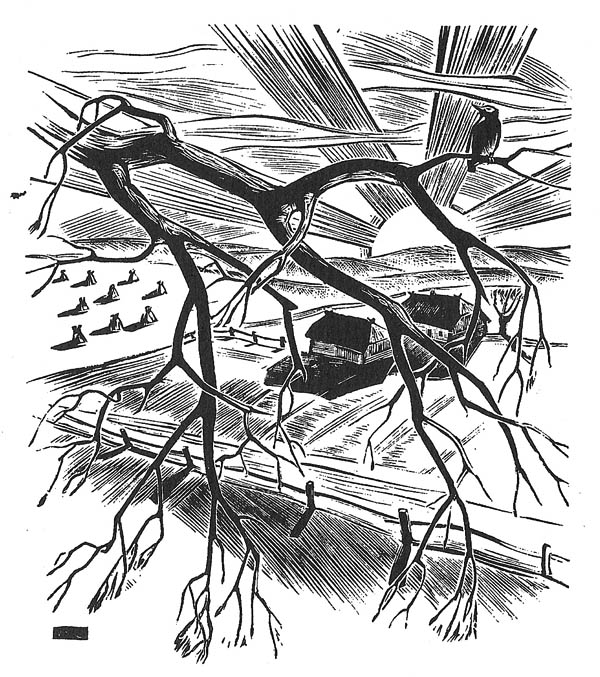
Woodcut from "The Seasons" by V. K. Jonynas
Skeletal Death racks all the shrubs and candid forests,
And the tempest tears and wastes away their beauties:
Branches where the birdlings, hatched in heavy leafage,
In the nest, as in a cradle, cried and twittered,
Or later plump with feathers, flew about and chattered,
And aflight .without their mother, caught their dinners
— Everywhere, all places have undressed themselves
And like brittle twigs and branches, quake and rattle.
— There, where he-bear cut his honeycombs from stumps,
And where she-bear muttered as she nursed her silly cubs,
Where the elk paused, frightened by the wolves that tear,
Where the wolves taught their new pups to rob and howl,
Where the hawk's whole household pecked at many chickens,
And where troops of ravens stole our little goslings...
There, look now, all pleasure's gone, has melted,
Crows alone joy in the foul decay of autumn,
While the birds, with all their songs concealed and silent
And their cares forgotten, sleep in their cool dreams.
(Clark Mills)
... Alas, the gardens, too, with all their loveliness —
Fresh buds arid blossoms sweet, the beauty of the spring,
And its divine perfumes — all, all has passed away!
The wealth that the green meads displayed in merry May,
The gifts that the lush fields gave forth in joyous June,
We now have gathered and stored up beneath the roof;
These riches now we cook and eat each blessed day.
You, you silly geese, and you, too, you lazy ducks,
Run to the pond and swim before the waters freeze.
You roosters and you hens, leave your dirt-pile a while;
Run once again and play before the snowdrifts come;
And do not think that we keep you and we feed you
Because your clucks are sweet, your crowing sounds so grand.
Ah, no! It is because we like your tender meat.
(Nadas Rastenis)
Wondrous is it to see women use dull knives,
Awesome, how good wives rattle their pots and pans.
Gryta, Pimė, have gone out to look for flintstones,
While Selmykė scorches wet mud from old footcloths.
Bergė and Katryna scour the frying pan,
And to make the flames burn hot beneath the kettle,
Blow with their big-bellied lips into the chimney.
Jekė and Magužė chop dry bits of kindling,
Enskys carries in an armful of good firewood.
Good-for-nothing Dočys, though, by the warm oven,
Licks his lips and dozes, waiting for his ration,
As for luncheon Astė stews a fine, plump rooster
And slides many wheat scones into the hot oven.
... All the kinfolk and the neighbors rushed together,
Nicely greeted both the bridegroom and the bride,
Then ran off to Krizas' house, to entertain them.
.. . The bride's parents had invited every relative,
Racked their heads, and paid out much for the arrangements:
Slaughtered three cows that were barren, and two oxen;
No count did the butcher make of pigs and mutton;
Of the geese and chickens, only one remained.
All these meats the Krizas' cook so chopped and pounded,
Violently boiled and roasted for the wedding,
Such a roar and tumult all along the street
Startled village neighbor Pauluks with amazement.
Petras, ladling the stewed pieces from the kettle,
Dragging roasts out of the oven with a hook,
Urged the hungry guests to set to, one and all.
Tušė, who had brought with her the finest linen,
Set the largest table, in the wedding style.
Then quick helpers piled the many foods together,
Set out pork, fat cuts of beef, brown roast of goose,
Lungs and liver, giblets, an array of morsels!
Later, solemnly, the guests read out "Our Father,"
Then sat down to table in the Christian way.
Affectionately Krizas begged his guests to eat
As the soul requires, heartily, with good cheer.
Enskys, a big carving knife in hand, at once
Offered to apportion the boiled meats and roasts,
But, no expert as the lords can be in carving,
Peasantlike, picked up the bacon with his fingers,
Jabbed at chunks and threw them on the laden platters,
Since, himself stuffed, he forgot to act politely.
Several guests, who'd tried the brandy to the hilt,
Couldn't even fix their eyes on such big slabs,
While some others, drunk and without knives themselves,
Clutched the bacon in their fingers and devoured it,
So that streams of fat were dripping down their beards,
For they felt no peasant, as a guest of Krizas,
Obliged to pay respects or act in lordly manner.
As they ate with pleasure in the peasant style,
Krizas called the servants, and they soon came in
Bearing strong beer in a barrel on a litter,
While the helpers hurried in with wedding pitchers,
Straining draught and heavy draught of milky beer,
Since a thickish beer that slides along the palate
In great gulps will too soon satiate the stomach.
Now the wedding guests, at their ease, having eaten
And too generously quaffed their heavy draughts,
Quite forgot to say their prayers, as Christians should,
And like pigs of manor serf (a shame to tell it),
Soon began to sing and squeal out swinish ditties.
Stepas told a lot of lies about fat mares,
Enskys sang the praises of his lordly oxen,
And the rest, all playing foolish pranks, made merry.
Lauras blew and with his finger tuned the bagpipe,
Jokūbas, having drawn the strings taut, scraped the fiddle.
Dočys, who had drunk and gorged himself too much,
Like some Polish sack fell down beneath the bench;
Everybody, quite alarmed by this event,
Bore him outside on a stretcher, half-alive.
. .. They swapped tales, and the musicians rushed
together,
Playing the peasant melodies, now for the dance.
Plyckius
clashed the cymbals, Kubas worked the fiddle,
Žnairiuks, with his lips
pulled sideways, trilled the fife.
Soon, then, Enskys, who had called
the girls to join in,
Urged them on to dance with the fine neighbor
lads.
Klisis, in his ugly boots, took hold of Tušė,
And they danced and kicked about like Lithuanians,
Over the earthen floor . ..
... Haven't we, poor wretches, worked and worked the fields?
Haven't we, as peasants must, run to our serfdom,
Manured furrows, strewn, plowed, and scattered grain,
Mowed the hay and raked it, spread about the litter,
And all earthly blessings gathered into barns?
Ah, what tasks have we not labored to complete!
Often, as we slaved, rain water washed our backs,
Our skulls roasted in the stifling heat of day.
And thus, as we tired ourselves, we often swallowed
Watered barley soup and gnawed at scraps of crust.
Often in muggy heat we gulped at thin flat beer
Or scooped up from puddles draughts of clouded water.
Sweat, too much, has poured across our dirt-streaked faces,
Rolled and splashed in streamlets down our noses.
Ah, poor wretches, worn and used up everywhere! . . .
... Often Lithuanians also number bounders
Who can hop about and speak
in Lithuanian,
Yet bring their disgrace on us like real Germans!
Many
of us, bloated to the full, stupidly,
Find a taste for singing German
songs and curses,
And like Germans, run to taverns every day.
Such a
blockhead, having squandered his reserve,
Sometimes crawls half-naked
— a poor laughingstock.
You who squander! Does God give his
earthly blessings
Everywhere for us, each day, so generously
That like
any swine, we should devour them always?
With good sense our stomachs
we must gladden daily,
But we must take care for needs above the
stomach.
. . . Don't we all know how we're born, with everyone naked.
Slippered
Duke as well as us poor devils in sandals,
Emperor the same as one of
his shawl-covered subjects?
Like the best-dressed gentleman, the beggar
is born moronic
And, no differently, he sucks on the breasts of a
woman.
Sir in silks and serf concealed by straw have to whimper
Till
the time when both at last start sensibly thinking.
Whether little serf
or master empties his bowels,
One must wipe his bottom with a strip of
linen,
Then must wash his dirty diaper out in water .. .
Every man must
make an effort even at gaping
Once he's spiraled out of darkness into
the daylight
And when later, dreaming in the cradle, he hollers;
Merely being born makes each one equally wretched.
Next time heirs are tucked in, in their elegant trundles,
While the kids in huts are shoved to shadowy corners
Or, if swaddled, set in shabby straw for their bedding,
Ask yourself if they themselves brought much of their riches
Of the gentry, not a one was born with his weapons,
Nor has any newborn peasant ever deliverad
Parts for rakes, his wooden plow, or teeth for a harrow.
Meeting peasants, highborn lords puff up with their pride like
Globes of bacon fat afloat on leftover soupstock;
But the wretched peasant, holey cap in his hands, stands
Trembling by his empty stove for fear of their lightning
Or, from far away, bows low, respectfully stooping.
God appoints a civil place for every person:
Some, parading crests as awe-inspiring princes,
Others, slogging through the muck as diggers of cowdung..,
(Theodore Melnechuk)
... There are many imbeciles who in their wicked
Hearts will look on the poor peasantry as louts,
Yet they do themselves often behave as louts.
Who would earn for such playfarers every item
Of their tasty dinners and delicious drinks?
Who would plow the fields, and plant, and sow, and harvest,
Who would thresh the grain, or cart it off to market,
If there were no Lauras, or no generous Krizas?
Don't we know how each lord with his family,
When in fall he's short of bread and succulent cakes,
Deep in troubles, thrusts a coin upon the peasant,
Strokes him kindly, pleads for generosity?
Then at once, big lord again, his arms akimbo,
Monstrous in abuse, torments the wretched man,
Or with smirks derides his simple home and cottage.
... Faithful as a true companion, I've instructed you,
Not in German, not in French have I praised you,
But in peasant manner, like a trusted friend
I have spoken openly, as words came to me.
There, already, we have gone past Martinmas,
and Advent now, with Christmas, is almost upon us.
Oh, how from the lowering west the furious winds
Northward, eastward veer and turn, as cold of winter
Moves its broad front toward us into Lithuania.
Ah, at least let's hasten to warm up our cottages,
In good husbandry ready the sheds for cattle,
And make sure that not a newborn piglet freezes.
Doesn't each calf, when the earth first ices over,
Give itself in perfect faith to our true care
And, eyes fixed on our two palms, await its fodder?
Let us give, but let us give with sense and reason;
How long winter may go on we do not know,
Nor foresee how much we'll have by Holy Easter.
Good it is, the hardships of a winter ended,
Finding we've a plump reserve that's comfortable.
Come now, let us part — an end to prattle!
Grant us, God, that after all the holidays, and
Live to joy the New Year in a holy manner,
We may gather once again to greet as neighbors.
(Clark Mills)
From THE CARES OF WINTER
... the winter's scowling wraths are already returning,
And again the bristling north wind is flying to scare us.
Look, how everywhere on pondwater panes are appearing
Just as, in that house, a glazier is putting in windows.
And the fishes' home, where bullfrogs saluted the summer,
Puts its armor on, because of the quarrels of winter,
Sending all its animals to sleep in the darkness.
There, the northern wind has frightened the fields with its scolding
So that bogs and swamps are shrinking, contracting themselves to
Stop the puddles of mud from their usual splashing and gurgling.
Listen, how the road, when skipping wheels try to strike it,
Rattles — having frozen — like a well-tightened snaredrum
So resounding that its sound keeps echoing in you.
Thus the world begins again to welcome the winter.
Well, I guess it's time: it won't be long'till Christmas
Holiday begins, and Advent wants to end by tomorrow.
Fall, that elephant, too painfully annoyed us,
Rudely spattering the mud it wallowed around in.
All who had to put some shoes on, bast or wooden,
Cursed the autumn for its works and its sloppy messes.
Gentlemen, who fly around on splendid stallions,
Going visiting each day in the finest of garments,
Also cursed the filthy autumn when the mud splashed.
Therefore all the people turned their faces northward,
Most impatient for a winter of dryness, complaining.
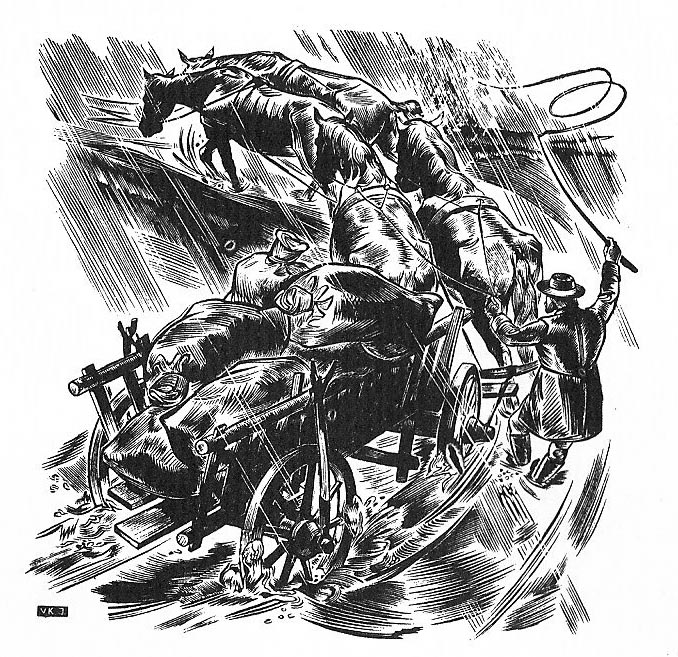
Then, while everyone lamented, a glow started spreading;
Soon, across the sky, the fluttering winds of the winter
Chased the stormy weather to the south, where the stork sleeps.
Later, thrusting out her head from the clouds, the winter
Quarreled like a shrew about the dungs of the autumn,
And, with frosts, she burned away its oozing labors;
Once she'd shoveled up the fall's manures, the winter
Built us all a road upon the horrible mudflats,
Teaching how to skate and fly again with sledges.
Now, where formerly we celebrated the springtime,
Gaily plucking for our use his herbs and his petals,
And where later warmer pleasures ended with summer,
There have risen drifts of snow with hillocks of whiteness,
And the flowers of the winter, that winter has woven.
It is wonderful to see how the forests of pinetrees
Show up everywhere, with curly crests, and bearded,
And, like powdered dandies, stand with elbows akimbo .,.
(Theodore Melnechuk)
. .. Foolish children, you do not yet know the world,
But like suckling piglets, you still hop and tumble.
Still, you, too, will meet with days of woe and sorrow.
Then, your dolls and wooden horses put aside,
Pressed by hardship, you'll seize work to earn and live.
We, decrepit ancients, we, the hunched old wretches,
Like you, we've hopped down the avenues of Eden
— Just like you, we celebrated our young summer.
Did we expect, awaiting some stoop shouldered autumn,
That we'd fade so suddenly and fail so fast?
Oh, the fragile creature scarcely saw his flower
Each man, lord or peasant, in his first beginning,
Born to heavy hardship, shows a raw new bud.
Truly, after suckling, as his soul requires,
Carefree, grows each day, climbs slowly from his bud,
Yet the blossom does not flower in one day,
Many days must pass before his bud can burst
And display, quite open, all his hidden beauty.
Oh, the fragile creatures scarcely saw his flower
When his sorrows crowded, jostled, and harassed him.
Don't we know what happens to us all, poor wretches
Who, like every green stripling, played and sported?
... Cold fields, there, up whose summer-rounded shoulders
We made scratches, then ran scattering the grain,
Sleep today in ice and snow like comforters.
They show none of God's magnanimous promises,
Nor His plans for us before we saw the world.
Yet with His help we shall know their full fruition:
Summer must come again, and we'll enjoy her balm.
We need time, so let us wait the time in patience.
Till the fields bring yield, let us not tire of waiting.
You, dear God! You, our heavenly benefactor!
You, in millennia before we could reflect,
Knew already how we should be brought to Light,
Knew our needs when we should come to meet that day ...
(Clark Mills)
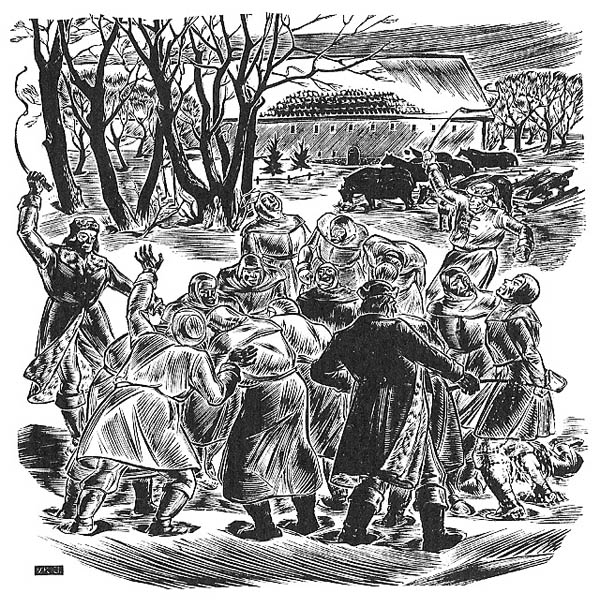
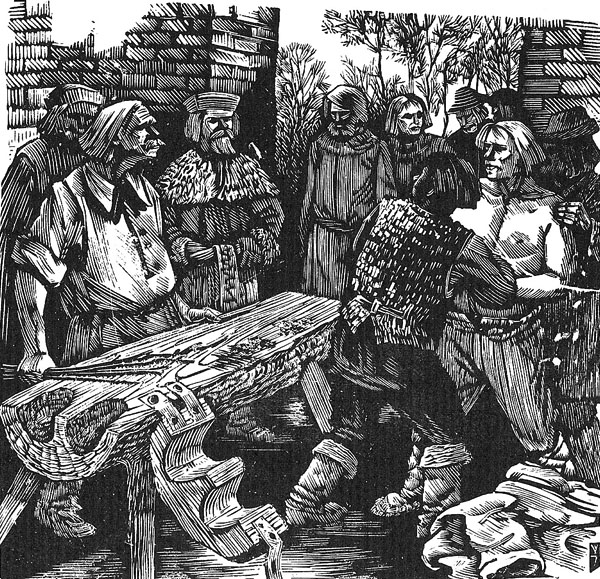
Woodcut by V. Jurkūnas in "The Seasons"